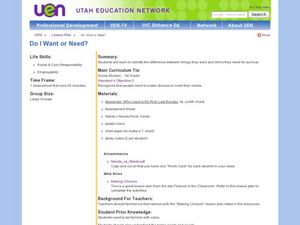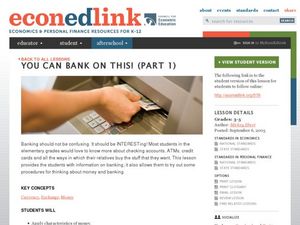Federal Reserve Bank
What Really Caused the Great Depression?
Falling wages. Rising unemployment. Falling prices. Sound familiar? Young economists look at the role the US banking system had in causing the Great Depression.
Global Secrets International
Help Your Kids Set Goals
Set young scholars on the path to success with this collection of goal setting worksheets. Offering support with setting and achieving personal and academic goals, this resource is a great way for elementary school teachers to help their...
Florida Department of Health
Understanding the Risk of Substance Abuse Unit
Teenage brains are different! Understanding that the teenage brain is still developing and thus more impacted by substance abuse is the key concept in a three-lesson high school health unit. Participants learn about how the brain and...
University of Wisconsin
Getting the Word Out
An appropriate way to celebrate and conclude the construction of a rain garden is to share it with the community. Small groups collaborate to design an outreach product such as a PowerPoint presentation, brochure, or poster, to draw...
Alabama Department of Archives and History
How Would You Feel? The Bravery of Civil Disobedience
As part of their study of the US Civil Rights Movement and the Montgomery bus boycott, class members read Dr. Martin Luther King's "Integrated Bus Suggestions." They then craft a short story about the first week of Montgomery bus...
Federal Reserve Bank
What Do People Say?
After reading a series of fictitious letters that represent actual events during the time period, young historians craft a small town newsletter to explain the causes of the Great Depression.
West Contra Costa Unified School District
Interest and the Number e
Mary, Mary, quite continuously, how does your money grow? Uses examples to examine the difference between simple interest and compound interest, and to take a look at different rates of compounding. Learners explore what would happen as...
Teach Engineering
Processes on Complex Networks
Introduces your class to random processes in networks with an activity that uses information about disease spread using the susceptible, infectious, resistant (SIR) model. Participants determine whether a susceptible person becomes...
Code.org
Identifying People with Data
How much information about you is out there? Scholars explore this question as they investigate data breaches and how these violations occur. They then take part in an activity where they research how easily people could get access to...
Library of Virginia
Life as an Enslaved People
As part of a study of slavery in the United States, class members analyze documents related to the sale of slaves. They consider not only the text of the bills of sale but also what the appearance of the broadsides suggest.
College Board
AP® Psychology Cognition and Language
I can remember what happened five years ago, but I can't recall what I did last week! High school psychology students analyze how memory, cognition, and language impact one another. Hands-on activities, memory exercises, and research...
Curated OER
The Influence of Advertising
Students recognize how and when advertising techniques can influence buying decisions. They also analyze the role of cultural, social, and emotional influences on financial behavior.
Curated OER
Financing Your College Education
Learners explore sources for funding college educations. They compile a portfolio of information gathered during their research.
Curated OER
"The Leaves in October", by Karen Ackerman
Pupils read a story about a family living in a shelter. They explore different places to save their money and the advantages and disadvantages of each.
Curated OER
Sources of Finance for Development
Young scholars identify the positives and negatives of foreign aid. They explain the main functions of the World Bank and the IMF. They discuss concepts related to these in class.
Curated OER
"Four Dollars and Fifty Cents," by Eric Kimmel
Students use the book, "Four Dollars and Fifty Cents" to discover ways that creditors can obtain payment from reluctant debtors
Curated OER
My Money
Learners identify and interpret the relationships between various components of currency, discusses the uses of money, and provides advanced lessons on making change. They also identify the various ways that money is used and how to use...
Curated OER
Reach For The Sky
Students consider alternative designs for a tall building and choose one of their designs to build. As a final step, they design and construct a model of a skyscraper.
Curated OER
Do I Want or Need?
Students explore wants and needs. In this introductory economics lesson, students use a "pinch card" to display whether a familiar item is a "want" or a "need". Students listen to the book Alexander used to be Rich on Sunday by Judith...
Curated OER
Where Should They Hold the Fundraising Party?
Pupils explore financial applications of linear functions. As they investigate the steps necessary to plan a fundraising event, learners explore minimizing cost and maximizing profits.
Council for Economic Education
You Can BANK On This! (Part 1)
Students investigate the concepts of money management and banking through Internet activities. In this economics lesson plan, students discuss the characteristics of money and how people once bartered with goods instead of paying with...
Curated OER
Bedroom Redecoration Project
In this bedroom redecoration project, your young mathematicians become interior designers. They plan, draw, and determine finances for the project. They apply their knowledge of working with decimals, geometric shapes, and problem...
Curated OER
Financial Literacy - Consumer Credit
Young scholars explore consumer credit and how it works.
Curated OER
Financial Literacy - Consumer Credit
Learners investigate consumer credit and how it works. They also examine basic types of credit, risks and responsibilities associated with credit, ways to establish and maintain good credit, ways to avoid hurting ones credit and what one...
Other popular searches
- Personal Financial Planning
- Financial Planning Activity
- Business Financial Planning
- Family Financial Planning
- College Financial Planning

























